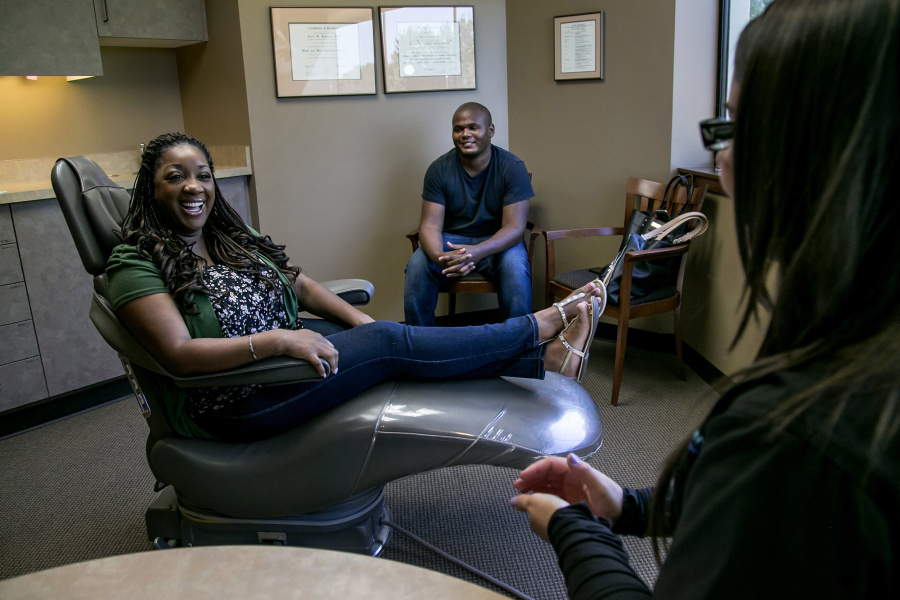KENT — A Kent woman with a rare genetic condition that caused her teeth to break and crumble to the gum line has a bright new smile — thanks to what one doctor likens to winning a lottery for dental care.
India Coleman, 31, spent most of her life in constant pain, suffering from frequent infections caused by the disorder known as amelogenesis imperfecta. She never hid her grin, but she was often embarrassed by the condition that prevents normal formation of dental enamel, leaving teeth damaged and discolored.
“I was ashamed, but I was still India,” said Coleman, who says she worked hard to fight the stigma of bad teeth. “I still had a personality. I wasn’t going to let it stop me.”
Last month, her struggle ended — because she won a contest sponsored by a Renton oral-surgery practice. Coleman received about $56,000 worth of free care, including removal of her old teeth and a set of full-mouth dental implants.
“You guys saved my life,” a broadly smiling Coleman told Dr. Ben Johnson of Pacific Northwest Oral & Maxillofacial Surgeons, who performed the seven-hour surgery. “It’s amazing.”
Coleman and a 30-year-old Seattle woman who has yet to begin treatment were chosen from more than 350 applicants and 25 to 30 finalists, Johnson said. Entrants filled out a form describing their difficulties and why they deserved help.
“It’s like a lottery,” Johnson said. “It’s like winning the scratch ticket at the 7-Eleven.”
Coleman’s treatment was a life-changing success, but it raises larger questions about access to dental care — and the lengths some patients must go to get it.
“For sure, that oral surgeon had good intentions, but I’m not sure that’s the best way to address disparities,” said Dr. Susan Hyde, chair of the division of oral epidemiology and dental public health at the University of California, San Francisco, who has studied dental care among the underserved.
“What happens to these people who don’t make the cut?”
That’s a question Coleman herself wondered, even as she celebrated her good fortune with her husband, Nigel Banister, and her mother, Cindy Brown.
“I said, ‘Mom, what about the others?’ ” said Coleman, who couldn’t afford the dental work and said she was turned down for years by insurance policies that deemed the services to be cosmetic.
In Washington state and across the country, severe dental problems aren’t rare and many people don’t have access to insurance or care, local and national figures show.
About 8 percent of adults in Washington state and 9 percent across the U.S. say their mouth and teeth are in poor condition, according to a survey conducted last year by the American Dental Association’s Health Policy Institute. Among low-income adults at the state and national levels, the figure is nearly 20 percent, the survey showed.
Across the U.S., about 108 million people have no dental insurance — and even those who do struggle to get care. More than 50 million Americans live in areas where it’s difficult to find dentists, according to the U.S. Health Resources and Services Administration.
Charity, crowdfunding
The Affordable Care Act mandated dental care for children, but not for adults, although Washington is among states that offer stand-alone dental plans on the insurance exchange.
Washington’s Medicaid program added back dental care for adults in 2014, but the state has some of the lowest reimbursement rates for service. It pays only about 41 percent of private charges, compared with 49 percent nationwide, the American Dental Association survey showed. In turn, about 29 percent of dentists accept Medicaid, compared with about 42 percent nationwide.
Even Johnson’s practice doesn’t accept Medicaid patients, primarily because of the low reimbursement rates. Instead, he and his colleagues regularly provide low- or no-cost charity care in other ways. They decided to hold the “Second Chance” contest, their first, after hearing about similar events across the country.
“It’s our way of giving back to the community,” Johnson said.
Nationwide, nearly two-thirds of dentists provided free or reduced-price care, according to a 2011 ADA survey.
People with severe dental problems and no care do have options, though not nearly enough, experts say. Dental schools such as the University of Washington School of Dentistry and Lake Washington Institute of Technology Dental Clinic offer discounted care to patients treated by supervised students.
Some turn to crowdfunding sites such as GoFundMe, which raise money for individual patients. In the past three months, about 5,000 dental-related campaigns pulled in about $2.3 million, according to a company spokeswoman.
And there’s the Seattle/King County Clinic, a giant health clinic that will be held for the third year at KeyArena Oct. 27-30. Last year, more than 2,100 people received free dental care at the event, including more than 1,400 extractions and 95 root canals.
Such charity health clinics, where people line up for hours in anticipation of free care, are common in many states. While they have laudable goals, the ethics of such first-come, first-served care is questionable, Hyde said.
“As a public health dentist, that’s not a good model for me,” she said, noting that untreated tooth decay is the most prevalent chronic disease worldwide.
Not only does it cause tooth loss, pain and infection, it can interfere with finding employment and social connections. Tooth decay and gum disease are also linked to serious health problems, including heart disease and stroke.



